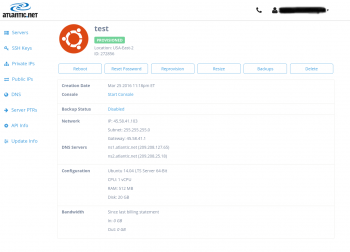Atlantic.Net vs Google Compute Engine
Go to provider selection to start a new comparison
We have tested 3 VPS plans from Atlantic.Net and Google Compute Engine. We'll show which one is best based on a detailed performance analysis, on features and prices.
Atlantic.Net was founded as a VPS provider in 1994.
It is headquartered in the USA.
It offers VPS and Dedicated hosting products.
- Canada
- United Kingdom
- United States
Google Compute Engine was founded as a VPS provider in 2008.
It is headquartered in the USA.
It offers VPS, Database, Storage and Networking hosting products.
- Australia
- Belgium
- Brazil
- Canada
- China
- Finland
- Germany
- Hong Kong
- India
- Indonesia
- Japan
- Netherlands
- Qatar
- Singapore
- South Korea
- Switzerland
- Taiwan
- United Kingdom
- United States
VPS Plans
| Plan Name | Monthly Price | CPU cores | Memory (GB) | Disk Space (GB) | Data Transfer (GB) | Latest trial | |
|---|---|---|---|---|---|---|---|
|
|
n2d-standard-2 | $63.35 | 2 | 8.0 | 40 | 0 | Jan 04 2024 |
|
|
c4-highcpu-2 | $66.19 | 2 | 4.0 | 40 | 0 | Jul 20 2024 |
|
|
n4-standard-8 | $276.73 | 8 | 32.0 | 0 | 0 | Oct 28 2024 |
Compare specs for all plans from all providers
Performance Grades
To summarize the performance of each VPS plan, we generated grades based on the various tests that were run: web, sysbench, endurance and remote timing tests. Each grade focuses on one aspect of the VPS speed or stability (cpu, disk IO, network IO...) and is made of one or more metrics measured during the tests.
Grades are evenly distributed between A and F. A is best, F is worst.
Follow the letter links to find the test results backing the grade.
Screen all VPS from Atlantic.Net and Google Compute EngineFeatures and Datacenters
This list is a subset of the features each provider may offer.
CPUs
These are the CPUs we have seen in Atlantic.Net and Google Compute Engine instances in the past 18 months.
| Atlantic.Net | Google Compute Engine |
|---|---|
| All Atlantic.Net CPUs by plan | All Google Compute Engine CPUs by plan |
|
AMD EPYC 7B12 INTEL(R) XEON(R) PLATINUM 8581C CPU @ 2.10GHz INTEL(R) XEON(R) PLATINUM 8581C CPU @ 2.30GHz |
Performance Consistency
The provider consistency score shows how much variation can be expected between 2 servers of the same type at the same provider. A high consistency score (>65) means the performance of all servers of the provider is consistent over many trials and many plans.
Providers who don't have enough data yet at VPSBenchmarks don't have a consistency score.
Screenshots
VPS Instance Provisioning Time
This is the average time it took to create an instance for Atlantic.Net and Google Compute Engine from instance order to instance accepting connections.
| Atlantic.Net | Google Compute Engine | |
|---|---|---|
| Number of instance creations in sample | 0 | 3 |
| Average provisioning time | 0s | 78s |
Performance in Depth...
These are some of the test results that are used to determine the grades above.
Web Response Times
We ran a database intensive web application at various levels of load on cloud servers from Atlantic.Net and Google Compute Engine. This is the average response time measured locally on the VPS for each plan we tested.
Local Response Time per Plan
Lower is better
Maximum HTTP Load
We ran a database intensive web application at various levels of load on cloud servers from Atlantic.Net and Google Compute Engine. This is the maximum rate of HTTP requests that each server handled without timing out.
Maximum HTTP request rate
Higher is better
Sysbench CPU Performance
We ran the full suite of Sysbench tests on VPS plans of Atlantic.Net and Google Compute Engine. These are the Sysbench CPU test results:
Rate of operations
Higher is better
Sysbench Disk IO Performance
We ran the full suite of Sysbench tests on VPS plans of Atlantic.Net and Google Compute Engine. These are the Sysbench Disk IO Random Read test results:
Rate of operations
Higher is better
Review and compare all Sysbench numbers on the Sysbench Comparison page for Atlantic.Net and Google Compute Engine.
Network Transfers
We have performed large file transfers from the Atlantic.Net and Google Compute Engine VPS and we measured the speed of downloads and uploads.
The transfers involve multiple files, 10 threads and last for at least 10 seconds at maximum speed. The transfers are repeated 3 times from different servers and only the fastest transfer is reported here.
Download Speed per Plan
Higher is better
Sustained CPU Endurance Tests
We pushed the CPU of those VPS plans hard for 24 hours straight.
This test shows how fast the VPS can go for long periods of time, how stable the performance is and it also gives clues on how overallocated the VPSs may be.
Throughput variations of the endurance test over 24 hours. The coefficient of variation is the standard deviation of the test throughput divided by its average value. Low variations mean that resources allocated to the server were stable for the duration of the test and there was little contention.
Ops/hour coefficient of variation
Lower is better
Having trouble finding the VPS that fits your needs?
Use the VPS Screener to quickly zero in on the specifications, performance and price that you're looking for.
Compare Atlantic.Net and Google Compute Engine against other providers
Run VPSBenchmarks on your own servers
With "Private Trials", the same benchmarks that run on all VPS at vpsbenchmarks.com will run on the servers of your choice. The results are private and you will be able to compare them to any other public benchmark on this website.
Run your first Private Trial for just $4.



